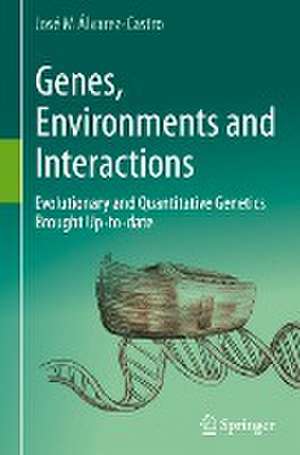Genes, Environments and Interactions: Evolutionary and Quantitative Genetics Brought Up-to-date
Autor José M Álvarez-Castroen Limba Engleză Hardback – 19 ian 2024
- The theory here compiled is supplemented with non-previously-published developments covering the broadest spectrum of simultaneously multiallelic and multilocus architectures with autosomal and sex-linked loci
- Arbitrary interactions (dominance, gene-gene, gene-environment, gene-sex, and parent-of-origin interactions) are accounted for
- Both effects of allele substitutions from the reference of individual genotypes and in the context of populations are worked out
- Populations are considered regardless of any departures from equilibrium frequencies (including both departures from Hardy-Weinberg, departures from linkage equilibrium, and non-random associationsbetween/among genes and environments)
- All developments are derived under the same mathematical framework, so that transformations of genetic effects between different contexts are easily allowed
All relevant concepts are carefully clarified and discussed from a historical perspective. The theoretical developments presented in the book are illustrated by built-in cases and applications with real data. Reassuringly, the adequacy of the theory here presented is corroborated based on the fundamentals of model development.
Preț: 947.98 lei
Preț vechi: 1156.07 lei
-18% Nou
Puncte Express: 1422
Preț estimativ în valută:
181.42€ • 185.79$ • 150.91£
181.42€ • 185.79$ • 150.91£
Carte tipărită la comandă
Livrare economică 18 martie-01 aprilie
Preluare comenzi: 021 569.72.76
Specificații
ISBN-13: 9783031411588
ISBN-10: 3031411587
Pagini: 224
Ilustrații: XVII, 224 p. 27 illus., 17 illus. in color.
Dimensiuni: 155 x 235 mm
Greutate: 0.52 kg
Ediția:1st ed. 2023
Editura: Springer International Publishing
Colecția Springer
Locul publicării:Cham, Switzerland
ISBN-10: 3031411587
Pagini: 224
Ilustrații: XVII, 224 p. 27 illus., 17 illus. in color.
Dimensiuni: 155 x 235 mm
Greutate: 0.52 kg
Ediția:1st ed. 2023
Editura: Springer International Publishing
Colecția Springer
Locul publicării:Cham, Switzerland
Cuprins
Chapter 1: Discovering The Genotype.- Chapter 2: The Primeval Theory Of Ge-Netic Effects.- Chapter 3: Genetic Effects Over One Century.- Chapter 4: Hgenetic Architectures At The Individual Level.- Chapter 5: Genetic Effects In Popula-Tions Under Linkage Equilibrium.- Chapter 6: A General Theory Of Genetic Effects.- Chapter 7: Variance Decomposition, Gene Mapping And Average Excesses—Orthogonality In The Spotlight.- Chapter 8: Applied Cases Of Advanced Genetic Modelling.- Chapter 9: The Comes And Goes Of The Black Box Perspective In Quantitative Genetics.- Chapter 10: Addendum: An Acid Test For Noia.
Notă biografică
José M Álvarez-Castro is a mathematician and biologist by training. He studied the maintenance of variability under selection during his PhD at the University of Santiago de Compostela (Spain). He then moved to the Ludwig Maximilian University (Munich, Germany) where he inspected the interplay between selection and genetic architecture of quantitative traits, a project led by Prof. Thomas Hansen at the Florida State University (USA). During his second postdoc, he worked at Prof. Örjan Carlborg's group at the Uppsala University (Sweden), where he set up the NOIA model of genetic effects, integrating previous models under a unifying mathematical framework. He then became an assistant professor (at the Swedish University of Agricultural Sciences). Eventually, he returned to the University of Santiago de Compostela, where he kept on implementing and applying models of genetic effects and variance decomposition as PI. He spent visiting periods at several renownedinternational institutions, like the Gulbenkian Institute of Science (Oeiras, Portugal) and the Roslin Institute (University of Edinbourgh, Scotland). Currently, he has held various assignments at the Department of Education, University, and Professional Training of the autonomous administration Xunta de Galicia (Spain), while remaining connected to the University of Santiago de Compostela as an external collaborator at the Department of Statistics, Mathematical Analysis and Optimization.
Textul de pe ultima copertă
Genetic effects are the core concepts from which quantitative genetics and the evolutionary synthesis emerged. The groundbreaking theory of genetic effects was first proposed over a century ago. This book revises that theory, both conceptually and mathematically, and brings it up-to-date.
All relevant concepts are carefully clarified and discussed from a historical perspective. The theoretical developments presented in the book are illustrated by built-in cases and applications with real data. Reassuringly, the adequacy of the theory here presented is corroborated based on the fundamentals of model development.
- The theory here compiled is supplemented with non-previously-published developments covering the broadest spectrum of simultaneously multiallelic and multilocus architectures with autosomal and sex-linked loci
- Arbitrary interactions (dominance, gene-gene, gene-environment, gene-sex, and parent-of-origin interactions) are accounted for
- Both effects of allele substitutions from the reference of individual genotypes and in the context of populations are worked out
- Populations are considered regardless of any departures from equilibrium frequencies (including both departures from Hardy-Weinberg, departures from linkage equilibrium, and non-random associations between/among genes and environments)
- All developments are derived under the same mathematical framework, so that transformations of genetic effects between different contexts are easily allowed
All relevant concepts are carefully clarified and discussed from a historical perspective. The theoretical developments presented in the book are illustrated by built-in cases and applications with real data. Reassuringly, the adequacy of the theory here presented is corroborated based on the fundamentals of model development.
Caracteristici
First treatise on genetic and environmental effects in the era of gene mapping and precision medicine Provides a comprehensive theory of advanced models of genetic effects Offers a revised way to learn and teach genetic and environmental effects
